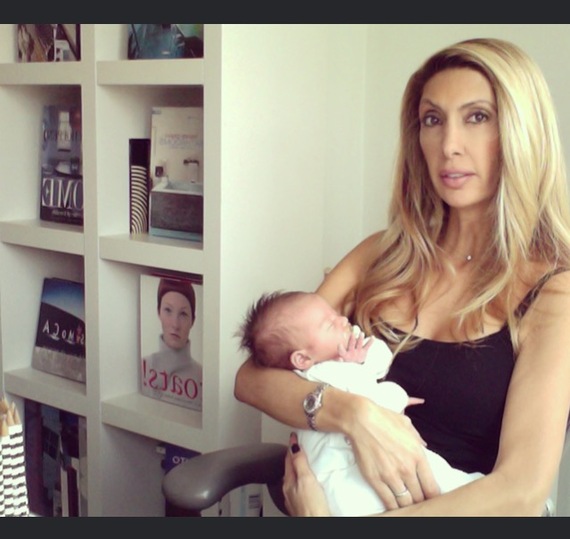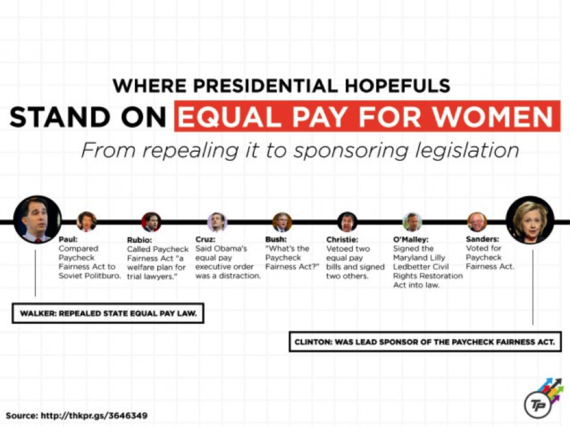
Sheryl Sandberg notwithstanding, more and more U.S. women are leaning back and out. America's ranking for female workforce participation has declined from seventh among the advanced nations to twentieth. Ironically, this is happening at a time when women are more likely than men to hold Bachelors degrees, and when formal barriers to career advancement are falling. As US Trust's Joseph Quinlan noted in a recent article in Business Insider, "wealthier and healthier, influencers and creators -- women now represent one of the most powerful economic cohorts not only the in United States but also the world." But only 50 percent fully participate in the economy world-wide, and just 60 percent do in the US, a "colossal waste of talent and a huge forfeiture of demand/spending."
I see it happening all the time -- women who went to Ivy League schools, Columbia, Princeton, you name it, and who held highly-demanding, high-status, high-pay jobs -- deciding to stay at home after they have a baby. They all thought carefully about their decisions, weighing the pros and cons. Instead of the prison of a 9 to 5 (or 8 to 9, more likely) work culture, they preferred to keep their brains sharp and stay connected by volunteering and sitting on boards.
And the fear of leaving a newborn in someone else's care is terrifying. As Amber Scorah wrote recently in the New York Times on the death of her infant son, "Why, why does a parent in this country have to sacrifice her job, her ability to provide her child with proper health care --- or for many worse off than me, enough food to eat -- to buy just a few more months to nurture a child past the point of vulnerability?" She describes the U.S. culture as one that, "places very little value on caring for infants and small children." And argues that:
Parental leave reduces infant death, gives us healthier, more well-adjusted adults and helps women stay in the workforce. If we truly valued the 47 percent of the work force who are women, and the value of our families, things would look different. Mothers could go back to work after taking time off to recover physically from birth and bond with their young children.
Yet antiquated government policies and inflexible work schedules, relics of the industrial age, hurt companies more than they realize.
As Gail Collins put it in the New York Times, "women falling out of the work force is....a huge deal. It reduces family standards of living and puts a crimp in the economy." A McKinsey Global Institute report found that if women participated equally in the economy with men, global GDP would increase by 26 percent or $28 trillion by 2025 -- the equivalent of adding another China and US to the world. If all countries simply matched the progress towards gender parity of the fastest-improving nations in their region, GDP would rise by $12 trillion, which is roughly equivalent to Japan, Germany and the UK combined.
Why is this happening? Four reasons:
1.Equal Pay. Though women are advancing over men in skills and education, they still only make 79 cents on the dollar on average. In some fields, the discrepancy is much worse.
2.Antiquated Family Leave Acts. 98 countries offer 14 weeks of paid maternity leave or more; the US currently grants 12 weeks of unpaid leave, thanks to the Family Leave Act of 1993. Papua New Guina and Oman, are the only other countries in the world that offer no paid maternity leave at all.
3.High Costs of Daycare. Add to that the skyrocketing costs of quality care, whether it's a fulltime nanny or a reliable drop-off facility. "It's incredible that we've built a society that relies on women in the labor force yet makes no discernible effort to deal with this problem," Collins continues. "And infant care is impossible. In most states infant care is more expensive than college tuition."
4.Inflexible Workplaces. Most law-makers don't have the progressive mindset to pass laws granting parents more control over their schedules. Nor do major leaders of companies and organizations. Of course some jobs require the worker to be in place at a set time, but most knowledge workers can work from anywhere, anytime. As long as workers can be trusted to deliver their work, there is no need to chain them to their desks. Women, want the flexibility to manage their time and schedules without having to ask for permission every time they need to accompany a child on a field trip or take them to the doctor's.
This is not just a problem for women; it's contributing to the decline of America as an economic powerhouse.
The current crop of presidential candidates have a lot to say about the crises we face in the areas of climate change, guns, immigration, ISIS, and the Middle East. Some of them have very strong feelings about Planned Parenthood. But what about the crisis of women in the workforce--and the productivity gap that their low participation is causing?
It's clear that Clinton, Sanders and O'Malley take the lead. The infographic and list below tell you where they stand on two of the four issues where government can weigh in:
Family and Medical Leave Act
Marco Rubio (R)
He wants to avoid the federal government getting involved but encourages companies to give at least 4 weeks by offering them a 25% tax credit.
Martin O'Malley (D)
He is a big supporter of the FAMILY Act because he believes that paid leave for both genders will help close the gender pay gap.
Ted Cruz (R)
He supports them personally but doesn't think it's government's job to mandate.
Bernie Sanders (I)
He is a big supporter and is a cosponsor of the Family Act.
Carly Fiorina (R)
She believes companies will do the right thing and that government shouldn't interfere with the private sector.
Hillary Clinton (D)
She supports a mandatory 3 month leave.
Rand Paul (R)
He has not commented on the issue.
Chris Christie (R)
He too hasn't formally commented on it but believes we need to remain competitive.
Jeb Bush (R)
He thinks it's a state decision not a federal one.
Donald Trump (R)
He told Fox News that America needs to remain competitive and that we should be careful of it.


